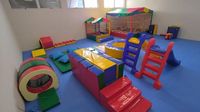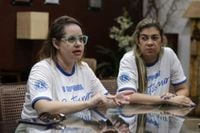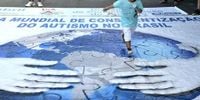April 2, 2025, marks World Autism Awareness Day, a day dedicated to raising awareness and combating prejudice against individuals with autism. This year, the spotlight is on the importance of early detection and intervention, as well as the need for inclusive educational practices for children on the autism spectrum.
Emanoele Freitas, a neuroscientist and biomedical professional from Nova Iguaçu, has personal experience with the challenges faced by families dealing with autism. Her son, Eros Micael, was misdiagnosed with profound deafness at the age of two. It wasn’t until he was five that he received the correct diagnosis of autism. “At that time, there was little discussion about the condition,” Emanoele recalls. Today, Eros, who is now 21, faced significant challenges in his academic journey, attending school until he was nearly 15.
According to Luciana Brites, a psychopedagogue at Instituto NeuroSaber, autism is a neurodevelopmental disorder characterized by deficits in social interaction, communication difficulties, and repetitive behaviors. “Signs of autism can appear as early as two years old, and early diagnosis is crucial for effective treatment,” she explains. The challenges of literacy and inclusion in schools remain significant for children with autism.
As of 2022, Brazil had approximately 1.37 million students with special education needs enrolled in regular classes, with 89.9% of them in inclusive settings. However, the reality of inclusion varies widely, with many teachers struggling to meet the diverse needs of their students.
In Rio de Janeiro, Isabele Ferreira da Silva Andrade is a mother of two children on the autism spectrum. Her daughter, Pérola, aged 7, has mild autism and epilepsy, while her son, Ângelo, aged 3, has moderate autism. Isabele’s journey began when she noticed developmental delays in Pérola, who spoke a language only she understood and seemed disconnected from her surroundings. After seeking medical advice, Isabele learned about autism and began a rigorous therapy routine for her children.
“I had to stop working to focus on their therapies,” Isabele shares, highlighting the sacrifices many parents make to ensure their children receive the necessary support. Both of her children are now in educational settings that accommodate their needs. Pérola attends a regular municipal school where she has access to support from trained professionals.
The Brazilian Ministry of Education has been advocating for inclusive education since 2008, emphasizing the importance of integrating students with disabilities into regular classrooms. Despite these efforts, the implementation of inclusive practices often falls short, with many teachers lacking the training necessary to support students effectively.
On this day, the Municipal Secretariat for Persons with Disabilities in Rio de Janeiro inaugurated a multipurpose room at the Centro Municipal de Referência de Mato Alto in Jacarepaguá. This new space, which includes sensory panels and a ball pit, aims to provide a supportive environment for children with autism. The initiative is part of a broader strategy to promote inclusion and respect for individuals with disabilities.
“Information generates empathy, empathy generates respect!” is the theme of the national campaign for 2025, reinforcing the idea that education and awareness are key to combating stigma against autistic individuals. The Secretariat serves over 2,000 autistic individuals in Rio, focusing on creating opportunities for development and inclusion.
In Bauru, the Lions Clube Bauru Autismo is organizing the 5th "Walk for Autism Awareness" on April 6, 2025. The event aims to raise funds for a sensory room in a public school, providing a calming environment for children during crises. Driele Floriano, the president of the Lions Club, emphasizes the importance of community support in advocating for the rights of neurodivergent individuals.
“Our goal is to show society that neurodivergent individuals have needs that are often unmet,” Driele states. The walk is expected to attract between 600 and 800 participants, highlighting the growing awareness and support for autism in the community.
Despite progress, advocates like Driele and her colleague Jaquelline Paterno acknowledge that there is still much work to be done. “While families are becoming more aware of their rights and the importance of early diagnosis, public services still lag behind,” notes Jaquelline, who is also a mother of an autistic child.
As the awareness campaigns continue, the focus remains on fostering environments where all children, regardless of their abilities, can thrive. The collaboration between families, educators, and healthcare professionals is essential to ensure that every child receives the support they need to succeed in life.
On this World Autism Awareness Day, the message is clear: early detection, inclusive education, and community support are vital for empowering individuals on the autism spectrum. It is a collective responsibility to create a society where everyone is valued and included.






